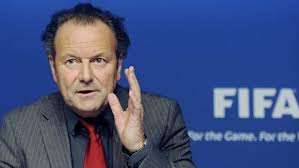By Andrew Warshaw, chief correspondent, in Mauritius
June 3 – Mark Pieth, the Swiss governance advisor whose strongly-worded intervention at last week’s FIFA congress put a spanner in the works of Sepp Blatter’s reform measures, has taken another swipe at the FIFA president, this time accusing both him and UEFA boss Michel Platini of jointly “hijacking” the entire process in Mauritius for political gain.
As the last of FIFA’s 209 delegations – or 207 to be precise since one didn’t turn up and another was not allowed to vote – left this Indian Ocean island after collectively patting themselves on the back having approved the reform package on Friday, Pieth put his own personal spin on proceedings by declaring that bickering between FIFA and UEFA had wrecked any chance of unity.
Head of the International Governance Committee which drew up the original proposals for change, only to have its role later downgraded and a number of its suggestions watered down , Pieth caused a huge stir on Friday by challenging Blatter and his colleagues to reveal their salaries.
Remuneration for senior officials has consistently been a touchy issue and one which the IGC had in vain pressed FIFA to throw into the statute changes. After his intervention, Pieth acknowledged in a press conference that FIFA had made genuine achievements in an attempt to clean up its act despite the fact that age and term limits – which UEFA were keen to implement immediately – were postponed for a year.
He conceded that the issue of age restrictions had been “hyped up” but in a separate briefing with reporters, he made it clear more could have been achieved had Blatter and Platini, whose relationship has become increasingly strained, refrained from playing politics as they sought to out-manoevre one another.
“In the last few months we’ve been in a tug of way with FIFA over a number of issues,” said Pieth. “They have made considerable progress because it’s hellishly complicated and we should not expect miracles overnight. But they could have done more. Age limits are not crucial but term limits are a different matter. You need to prevent old boys networks from continuously replicating themselves. But what you had was internal bickering between FIFA and UEFA.”
UEFA’s own proposal for reform was that term limits should apply only to the FIFA president and not to members of the executive committee and Platini sees the postponement of any decision by the Congress as a deliberate ploy to keep the path clear for Blatter, currently 77, to stand for a fifth presidential term in 2015 if he decides to do so.
Indeed, in the days leading up to the FIFA Congress, Platini criticised FIFA’s inability to act on age and term limits, suggesting the inertia of the executive committee represented a total lack of collective will.
As expected, his entire confederation abstained when the motion to postpone was put to the vote and was approved by a 123-16 margin, with 68 abstentions. Blatter, for his part, will only countenance term limits if they apply to everyone else among the hierarchy and not just the boss. Hence the impasse. “My take is that two people are hijacking the whole process for political reasons,” charged Pieth who has yet to decide how long to continue his advisory role, if required, but has hinted at maybe one more year.
“This is unfortunate because the reform process should have nothing to do with these people. I’m thinking beyond individual presidents. Maybe we should not expect any more because let’s face it, they are politicians. This is all about trying to trick each other. The whole reform is about change of culture and this shows they are not there yet.”
Contact the writer of this story at moc.l1734864602labto1734864602ofdlr1734864602owedi1734864602sni@w1734864602ahsra1734864602w.wer1734864602dna1734864602

